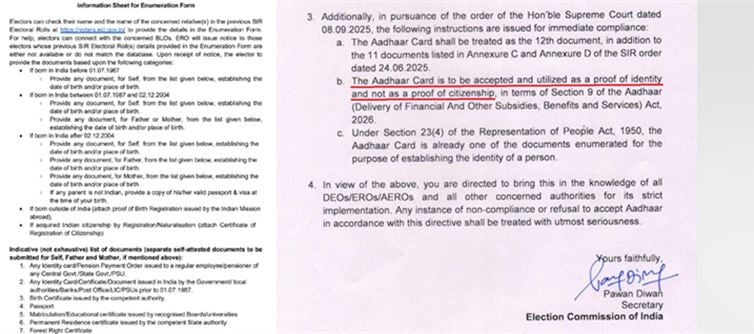
🔥THE UNCOMFORTABLE TRUTH
Democracy demands clarity: to vote, a citizen must prove they are a citizen. Yet the ECI’s recent notification for the special intensive revision of electoral rolls says the Aadhaar card cannot be used as proof of citizenship, only identity. Meanwhile, the list of other acceptable documents includes items like passports, birth certificates, matriculation/educational certificates, etc.
That raises serious questions: Which documents count as proof of citizenship? And if a “matriculation certificate” is on the list, is it really proof of citizenship — or simply an easier shortcut? Why is Aadhaar singled out for clarification, while other documents sail through unchallenged?
💥 1. Aadhaar: Identity Yes. Citizenship No.
The ECI has formally informed the supreme court that Aadhaar is to be used solely as proof of identity for inclusion or exclusion in electoral rolls, not as proof of citizenship. The ECI points out that the unique identification authority of india (UIDAI) has itself clarified, via an office memorandum, that Aadhaar does not confer proof of citizenship, residence, or date of birth.
In effect, possessing an Aadhaar card does not guarantee you’re a citizen — just that you have the number and biometrics tied to some identity.
🧪 2. Other Documents: Quietly Accepted Without Clarification
The list of acceptable documents for the revision of electoral rolls under SIR (Special Intensive Revision) includes items such as:
Passport of India
Birth certificate
Matriculation/educational certificate issued by recognised boards or universities
Permanent residence certificate issued by the competent state authority
Scheduled Tribe / scheduled caste / OBC certificate by the competent authority
Family register prepared by the state or local authority
Land/house allotment certificate by the government
…among others.
Notice: the ECI has not issued a similarly strong clarification for all these documents, saying “this is not proof of citizenship”. The only prominent public line is about Aadhaar. This selective flagging raises multiple issues.
🎯 3. Is a Matriculation/Educational Certificate Proof of Citizenship?
A matriculation certificate is essentially a school‐leaving certificate or educational credential. It typically certifies that the person has completed a course of study up to a certain level (often 10th standard). It does not, inherently, certify that the person is a citizen of India. Citizenship is a legal status defined under laws such as the Citizenship Act, 1955, and the Constitution of India.
Thus:
If the matriculation certificate is accepted as proof of citizenship, then the standard is looser (since the certificate wasn’t designed for citizenship verification).
Suppose Aadhaar is not accepted as proof of citizenship (because the law says so), but others are accepted. In that case, the system treats different documents with different weight — essentially “some documents count for citizenship, some don’t”, but doesn’t publicly explain why.
🤔 4. Why the Double Standard? The Questions That Follow
If Aadhaar is singled out for “not a citizenship proof”, why hasn’t the ECI similarly clarified for all other documents?
Does accepting a matriculation certificate (or birth certificate) implicitly treat it as proof of citizenship, or is the expectation that citizenship is already assumed if such documents exist?
Are citizens being required to interpret which documents count for what — leading to confusion, potential exclusion, and risk of disenfranchisement?
Most importantly, Shouldn’t the rule be clear, uniform, and transparent rather than leaving people to guess which documents establish citizenship vs identity?
📌 5. The Real Stakes: Citizenship, Voting Rights & Inclusion
Voting is a right reserved for citizens. If documents are ambiguous, inconsistent, or subject to selective interpretation, then the very foundation of electoral inclusion becomes shaky. The public needs clarity on:
What exactly is proof of citizenship for electoral purposes?
How does the ECI verify this legally and uniformly?
Why is there selective public messaging (only on Aadhaar) rather than full transparency on all documents?
Because when the line between “identity” and “citizenship” is blurred, eligible voters risk exclusion — especially in revision exercises like SIR, where documentation burdens are high.
And if, for example, a matriculation certificate is being treated as a citizenship proof without a clear legal basis, that may open up legal challenges, arbitrariness, and inequality.
🧨 FINAL MIC-DROP
In a democracy, every citizen matters. But when the rules ask “Show us you’re a citizen” and the document list whispers “Here are some you can use—but we’ll only explain one of them”, the system breeds doubt, confusion, and exclusion.
If Aadhaar isn’t enough to prove you’re Indian, then the people deserve a full, transparent list of which documents are, and why.
Because rights should rest on laws and clarity — not on guesswork and selective messaging.




 click and follow Indiaherald WhatsApp channel
click and follow Indiaherald WhatsApp channel